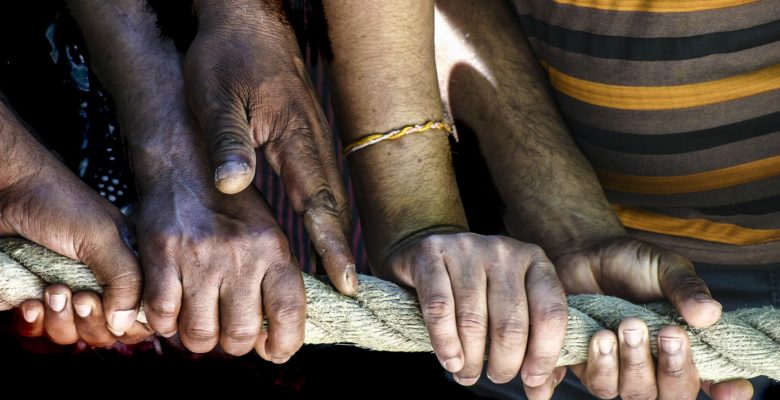Addressing health injustice in the United States through accountability & citizen participation
Submitted by Kat Lahr
PROLOGUE (COVID-19 update)
I wrote this post before the coronavirus outbreak and I wanted to add some additional thoughts about this global pandemic as my words below are even more important and evident now.
The novel coronavirus affects everyone, but some groups suffer more, such as marginalized populations who live in poverty and those who suffer due to health inequities. Coronavirus is exposing all of the weaknesses in the U.S. health system and has shown that the nation was less prepared for a pandemic than countries with universal health systems due to lack of universally accessible screening and the uninsured or underinsured still priced out of care. Those losing their jobs due to the economic shutdown will subsequently lose their health insurance coverage, showing us is just how unreliable the employer-based framework really is. In the interim, U.S. legislators have agreed to make American healthcare more like other nations by making COVID-19 treatment free or low-cost at the point of service, either by having the government cover the cost or by mandating private health insurers to cover services related to the pandemic. This helps bridge the insurance coverage gap for those who do not have private health insurance or qualify for Medicaid and was a pivotal and encouraging development. But this would have been far more impactful if it was already in place, removing any delay in care to anyone in an effort to control the spread. Amid this crisis, millions of Americans are now demanding that we have a government that works for all, making a stronger case for universal health coverage. As a result, it’s important that local and global public health leaders continue to pursue health equity during the outbreak response, aiming to protect vulnerable and marginalized communities from COVID-19.
Even though Eleanor Roosevelt, human rights champion and First Lady of the United States, was Chair of the United Nations Commission that wrote the Universal Declaration of Human Rights in 1948, the U.S. still stands alone within the developed world in not making healthcare a basic human right to all of its citizens, without a mandate to provide universal health coverage (UHC) independent of income. This means that healthcare is, instead, treated as a commodity for most people, something that is bought, considered a privilege and a benefit. Recently, all United Nations member states adopted the Sustainable Development Goals of 2015, agreeing to try to achieve UHC by 2030, urging governments to move toward providing all people with access to affordable, quality healthcare services as a part of sustaining our human race and planet. Although these goals are a beautiful example of a universal call to action to protect the planet and ensure that all people enjoy peace and prosperity by 2030, unfortunately, accountability is lacking. The goals are all aspirational. There will be no sanctions or the like on the U.S. for not adhering to these goals. Americans have to take it up with their government if it does not do so. The United Nations will not.
While states are formally accountable to their populations, people often have limited meaningful opportunities to hold their governments accountable. However, I firmly believe in the power of the people and their voting rights to help provide pressure for domestic accountability towards UHC if they are supported by a treaty such as the Framework Convention on Global Health (FCGH). This treaty is aimed at addressing the shortcomings in implementing the right to health, including through binding standards requiring accountability and enforceability. The FCGH Alliance is in the process of articulating these standards. These binding remedies would hold states accountable for health justice violations and would advance health equity by better ensuring that those responsible for the abuses answer for their actions.
One of the key principles that the FCGH Alliance proposes for the Framework Convention on Global Health centers around empowering people to claim and enforce their right to health. However, this all begins with education and being informed. Yet governments, especially in the U.S., often fail to adequately equip users with a good understanding of the health system. Information makes one liberated and is the foundation of progress. If Americans become knowledgeable, they have power, and that power can impact their healthcare system, enabling health to become a right embodied in U.S. law, and changing the status quo in which powerful interests, whether wealthy segments of the population who want to keep taxes low or corporations that prioritize their profits, keep the commodity-based system intact.
The recent U.S. comprehensive health law, the Affordable Care Act (ACA) of 2010, helped to increase access, decrease costs, and raise quality standards. However, the Act lacks any provisions regarding the duty of the government to develop capacity in empowering people to claim and enforce their right to health. The ACA does include transparency of claim denials by insurers, costs of services and quality scores by providers, but is mute on principles that empower people to demand accountability from the government itself.
The FCGH would seek to improve national accountability to health commitments, including by promoting the principle of people’s meaningful participation in developing, monitoring, and evaluating laws, policies, and programs that may impact their right to health. A genuine opportunity to influence decisions related to their health equity must be available locally, regionally, and nationally for everyday citizens, non-citizens, and civil society organizations. For example, a discussion draft of the FCGH includes a section on Participation that could contribute to accomplishing this. Other organizations, such as the National Issues Forum (NIF) can partner with and develop local town and district health committees and working groups that include members of the public.
There are plenty of options available that elected U.S. public representatives can utilize to empower their constituents. However, provisions in federal health legislation must be developed to enforce this participation, such as requiring a certain number or percentage of people from various jurisdiction to participate before laws affecting the right to can become enacted or providing funding to enable these participation opportunities. An FCGH can assist and advise on the best way to bring about this accountability and participation for each country, in this case, the United States.
But for a treaty like the FCGH to be successful in the United States, Americans must be informed enough to accept it and put pressure on their elected representatives to support it. I see the FCGH Alliance as a partnership that can help Americans become more educated on health policy and their rights and cause this pressure to mount.
In an effort to help move toward health equity in the U.S. through getting information to the American people, I have recently published a book to help close the gap of the health system illiteracy. This book aims to provide a snapshot of the core dialogue taking place in our healthcare system and provides a moral argument for health equity. I provide evidence showing how health inequity is the basis of the United States health system’s problems and the need for accountability and citizen participation as a requirement for any lasting change to happen. My book aims to provide a path for social empowerment for the often powerless American healthcare consumer.
The balance of profit and social justice is a true dilemma in the U.S. healthcare system and leads to a level of inequality that is unconscionable. Its commodity-based system forces leaders of health organizations to be motivated by money, deterring them from the mission of caring for the sick and injured, promoting prevention, and keeping people healthy. For example, healthcare is unaffordable and inaccessible for many, yet executives of these companies take home salaries at the amount of millions of dollars. And many legislators make decisions that decrease coverage instead of increasing it, making healthcare more expensive for people, even while high compensation for executives continues. This commodity-based system has put incentives in the wrong places, compromising health justice.
Implementing an FCGH in the U.S. would include catalyzing a domestic health financing and accountability framework that would protect limited resources for healthcare by demanding increased transparency and combating corruption through pathways such as improved resource allocation disclosure requirements and better enforcement of standards to ensure accountability for any misuse of public health resources. Moving to a system where the incentives change and the priorities shift to include everyone, will move us towards health justice. What a government prioritizes and spends its money on defines what is important to it, and extending access to quality healthcare to everyone has never been made a bi-partisan priority in the United States.
One of the biggest issues in the U.S. healthcare system is not the lack of money for universal health coverage but how limited healthcare dollars are being spent. The U.S. is already paying what other countries pay for universal health coverage—except the U.S. doesn’t have it. Instead its current largely privatized and fragmented commodity-based healthcare system costs more than public healthcare for other countries around the world. It bears repeating: the U.S. is already paying for the cost of Universal Health Care and then some. An FCGH would provide legal backing in negotiating laws and policies that provide non-discriminatory healthcare to all, a long-standing global public health goal, and help elected public officials push back against policies that do the opposite through clear requirements for equitable distribution.
Society suffers injustice when not everyone gets to share in the benefits and when distributions of resources are not equal. When health equity is compromised, health disparities shade society with injustice, which is the unfortunate reality in the United States. For example, 21% of non-elderly Hispanic people are uninsured, while only 8% of whites are. Additionally, babies born to black women with professional degrees are about three times more likely to die than babies born to white women with only a high school diploma or its equivalent. The FCGH shall be the foundation upon which marginalized communities in the U.S., such as people of color and low-income individuals, who have long been discriminated against and excluded from decision-making, will be ensured of avenues to demand their right to health and justice.
No matter what our circumstance, environment, or influence, we are human, and basic rights for everyone in all positions of society must be observed to truly live in a moral, ethical, and just society. I am encouraged by the mission of the FCGH Alliance and its vision towards a more just society that ensures the right to health for all people by addressing health injustice through governmental accountability and citizen awareness and participation.

Kat is an award-winning writer, educator, reformer, health advocate, and believer of healthcare as a human right. She holds an MBA and is an inductee of Sigma Beta Delta, the National Honor Society in Business, Management, and Administration. As an Adjunct Professor, she became very passionate about educating the community about health policy and the current social issues that plague the industry. Her passion for public health has given her appointment by a former Illinois Governor on the State Health Improvement Planning and Healthy Illinois 2021 Planning councils where she hopes to positively influence health policy. She believes that most of us aren’t comfortable watching people suffer when help is available, and when we assist each other in surviving, everyone benefits. She advocates for awareness, transparency, and a person’s right to know. Information about her most recent book can be found at www.toerrishealthcare.com/book-1.


